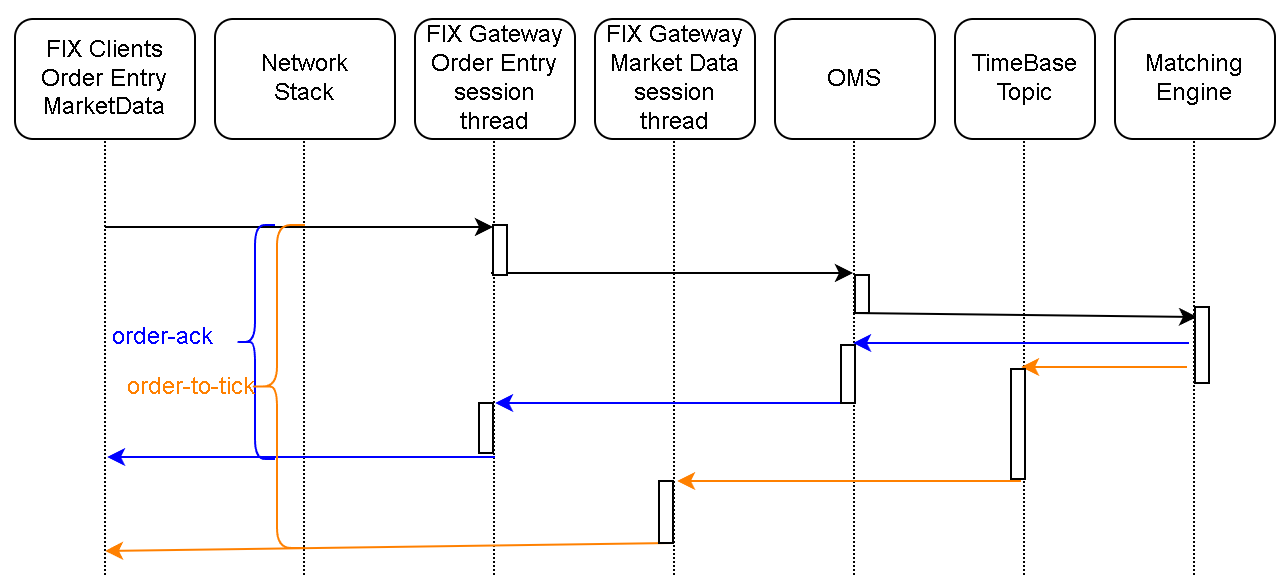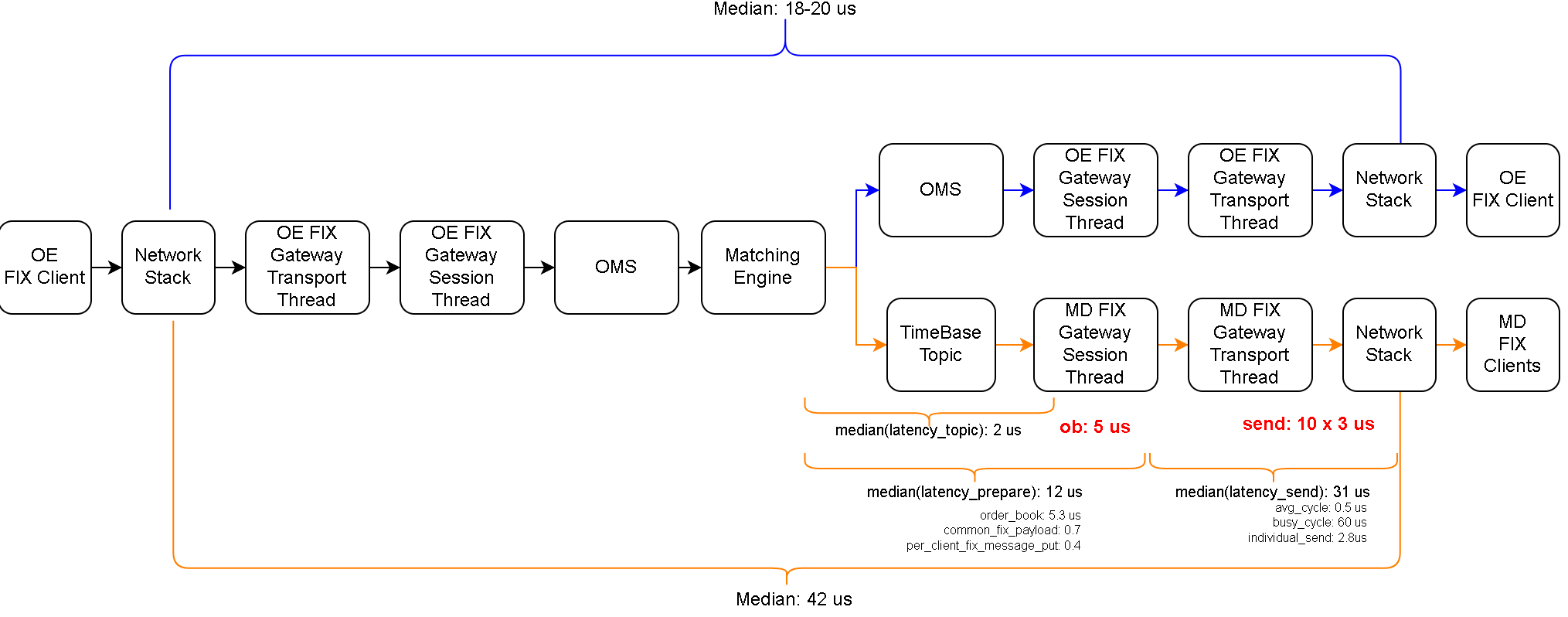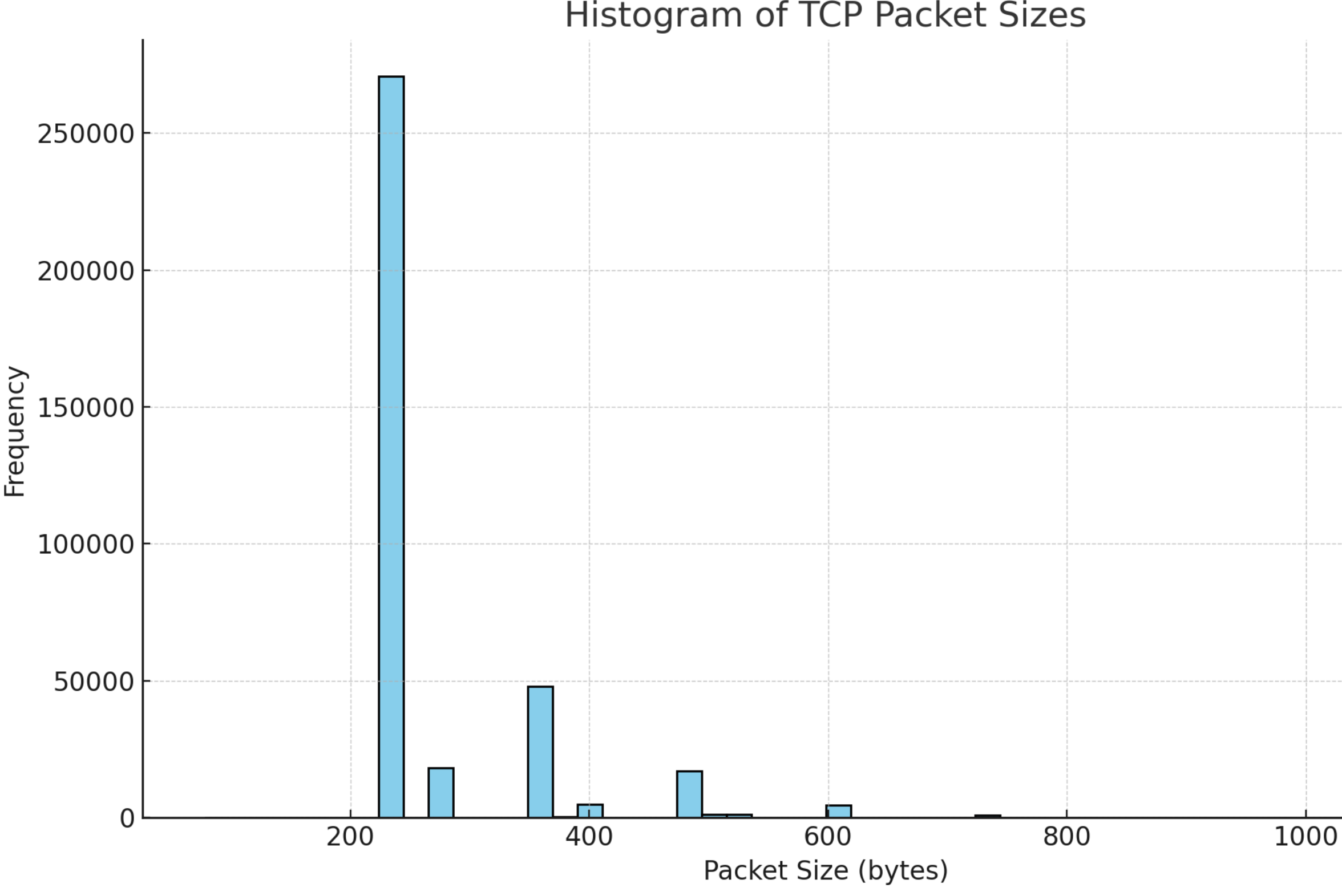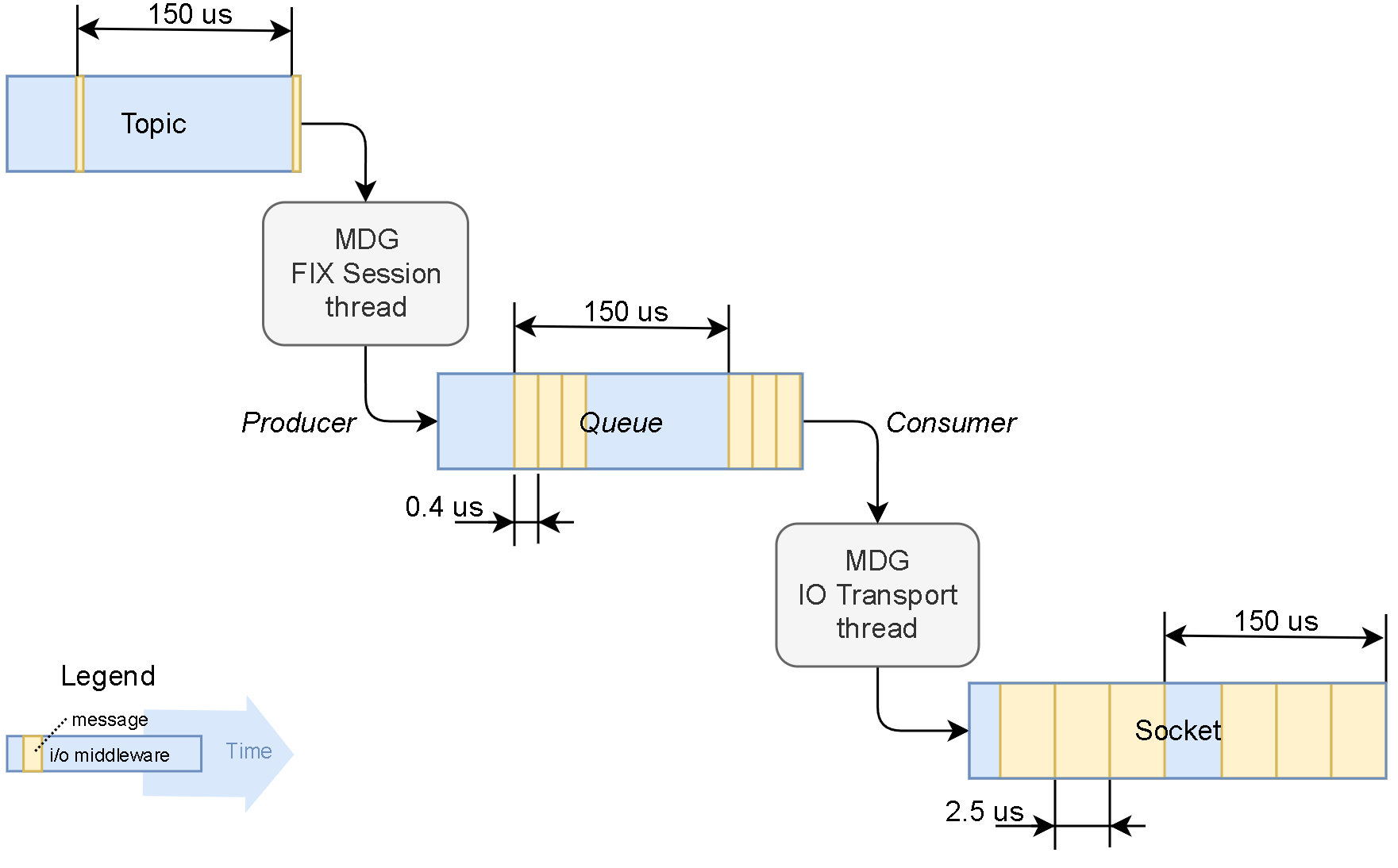Order to Tick Latency
Order to Tick Latency
October 2023
This document outlines the benchmarking of the order-to-tick latency for a FIX Market Data Gateway. Specifically, it measures the latency from the instant an inbound network packet, containing a user order, enters the TCP stack to the moment an outbound TCP packet signifies a market data change, either as a passive quote or trade. In both scenarios, we intercept FIX messages.
Draft
Summary
The median order-to-tick latency, across 10 FIX clients, was 42 microseconds. This metric measure timestamp difference between the TCP packet containing the FIX order and the packet with the corresponding order book update in the FIX message.
November 2023 Update: above results were obtained on realistic benchmark running on AWS. Based on these findings we were able to achieve median order-to-tick latency of 20 microseconds on client production environment (largely due to TCP bypass provided by Xilinx Onload).
Market Making Exchange
In this experiment model of market making exchange:
- 10 FIX clients sending combined rate 25000 order request per second to FIX order entry gateway
- Orders are routed to NIAGARA matching engine
- A realistic mix of MARKET and LIMIT orders results in certain percent of partial and complete fills, cancellations, and small number of rejections. Order prices use normal distribution where median price of BUY and SELL orders.
- Special care is taken to avoid growth of number of orders that are active in matching engine at any given point of time. Orders that remain active have maximum lifetime before client cancels them.
This model allows running FIX clients for many hours under sustained system load.

Configured test parameters:
- Order request rate = 20K order requests per second
- Order lifetime timeout = 60 seconds
Observed rates:
- Matching Engine produced around 30K of order events per second (combination of fill, cancel, and rejection events)
- around 6.5K/sec or market data update messages (incremental update messages possibly containing multiple data entries)
- market data distributed to 10 connected FIX clients resulted in around 65K per second of FIX market data update messages.
Environment
- Server: AWS c6id.12xlarge, Amazon Linux 2, docker-compose, Amazon Corretto 11 JVM
- Client: AWS c6i.4xlarge, Amazon Linux 2, Amazon Corretto 11 JVM
Method
Step 1: Capture inbound FIX order entry and outbound FIX market data traffic. For our experiment this was done using
sudo tcpdump -i eth0 "tcp portrange 12001-12010 or tcp portrange 10001-10010" -w capture.pcap
Step 2: Use "OTT" version of latency tool to analyze recorded traffic. The tool correlates outbound FIX market data messages (35=X, tag 278 identifies each quote) with order acknowledgement messages referring to the same quotes (35=8, correlated tag 37 is quote ID, tag 11 is order ID), and then with inbound order new single (35=D, correlated with 35=8 using tag 11) messages.
wget https://s3.amazonaws.com/quantserver43.deltixlab.com/test/latency-tool-centos-linux-x64-1-0-16-4-ott.zip
unzip latency-tool-centos-linux-x64-1-0-16-4-ott.zip
./lt-ott
Comparison with order acknowledgement latency
Since this order-to-tick experiment used the same method as order acknowledgement latency (as described here) it may be appropriate to compare the two.
In both latency metrics initial moment of time is network packet containing FIX order entry request. In both metrics signal travels to matching engine using the same path.

However, in case of the order-ack-metric - order acknowledgement event travels back using reverse path, in order-to-tick experiment described here market data are sent to TimeBase Topic rebroadcasted by FIX market data gateway. Each market data message is then broadcasted to 10 subscribers.
This table shows results of both latency tests taken on AWS from the same setup:
| metric | order-ack | order-to-tick |
|---|---|---|
| 50% | 18 us | 42 us |
| 90% | 32 us | 67 us |
| 99% | 40 us | 91 us |
Identified bottlenecks
Here is another diagram shows signal path for order-to-acknowledgement (blue) and order-to-tick (orange):

We instrumented FIX Market Data gateway with tracing clocks and analyzed timestamps available at intermediate points. This identified two main bottlenecks:
Level3 Order Book processor - QuoteFlow Order Book processor employed to maintain order book state in FIX Market Data Gateway takes about 5 microsecond per market message. November 2023 Update: Implemented new L3 Order Book library that reduces median processing time from about 5 to 1 microseconds.
Sequential calls to non-blocking Socket send API in Java NIO. In this experiment with typical payload size of around 240 bytes, cost of doing non-blocking socket send was about 2.5 microseconds per call. When we distribute each signals to all ten connected clients sequentially this cost accumulate.
*November 2023 Update: Switching to TCP bypass solution Xilinx ONLOAD reduced this time from 2.3 to 0.78 microseconds.

Market message rates and cost of send
Session thread of Deltix Market Data gateway spends about 0.4 microseconds preparing individual FIX Market Data Update (35=X) message for each connected FIX client (counting time to enqueue message to Transport thread). While body of the message is reused between all connected clients, each message still has individual header and footer that reflects differences in FIX Comp IDs and sequence numbers, as well as overall length, sending time, and message check sum.
As result FIX messages come to transport thread in bursts:
 At the same time transport thread spends about 2.5 microseconds on average performing non-blocking socket send for each FIX message. As result, after idle periods transport thread usually discovers batches of 10 messages to send to each individual client socket.
At the same time transport thread spends about 2.5 microseconds on average performing non-blocking socket send for each FIX message. As result, after idle periods transport thread usually discovers batches of 10 messages to send to each individual client socket.
Xilinx Onload effect
Before
01:25:43 - INDIVIDUAL_SEND
Percentile (%) Value (ns) Count Count Sum
0.000 594 1 1
10.000 2511 444393 444394
20.000 2607 448391 892785
30.000 2673 448595 1341380
40.000 2725 439567 1780947
50.000 2773 440579 2221526
60.000 2823 444944 2666470
80.000 2955 891379 3557849
90.000 3073 441066 3998915
99.000 4065 396632 4395547
99.900 5415 39735 4435282
99.990 7223 3997 4439279
99.999 10319 397 4439676
100.000 26735 44 4439720
[Min 594 ns, Mean 2796 ns, Max 26735 ns, Total 4439720]
After
14:27:30 - INDIVIDUAL_SEND
Percentile (%) Value (ns) Count Count Sum
0.000 254 1 1
10.000 650 424311 424312
20.000 677 413387 837699
30.000 701 409609 1247308
40.000 734 421855 1669163
50.000 781 409242 2078405
60.000 817 422744 2501149
70.000 845 413609 2914758
80.000 872 415617 3330375
90.000 911 411055 3741430
99.000 1284 370936 4112366
99.900 1996 37318 4149684
99.990 2543 3736 4153420
99.999 3285 369 4153789
100.000 8855 41 4153830
[Min 254 ns, Mean 788 ns, Max 8855 ns, Total 4153830]
To be continued...